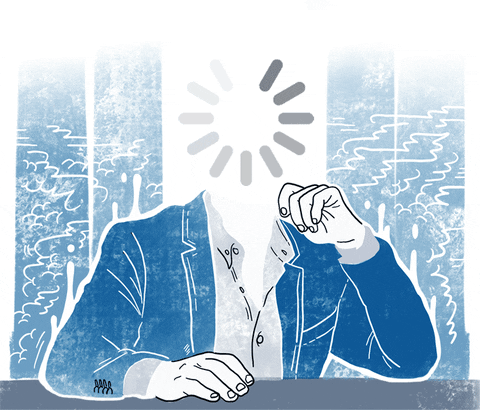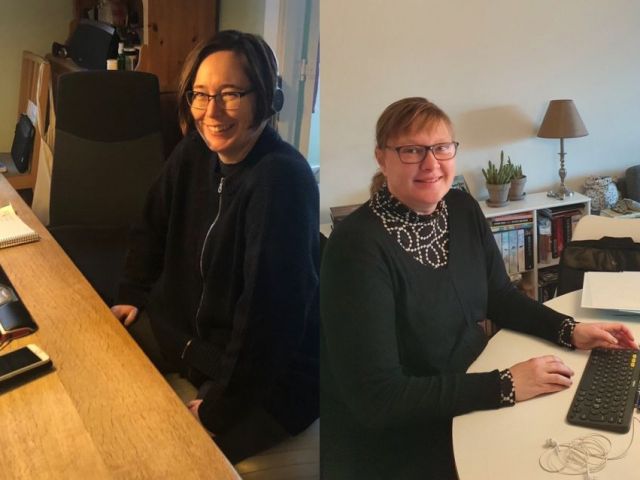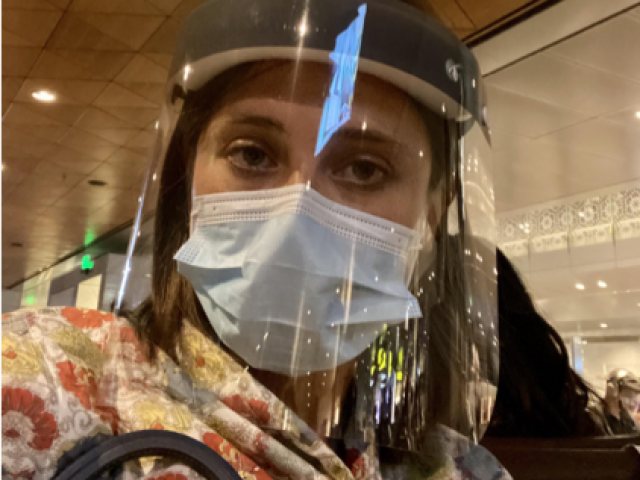Do you talk about your never-ending invisible work? Perhaps you should

(Illustration: Emil Friis Ernst)
Digitalization projects in the public sector often result in invisible work, claims CBS researcher Ursula Plesner. A new research project puts this invisible work under the magnifying glass and aims to express what it is and how it makes organizations flow.
When the Capital Region of Denmark introduced its digital health platform, Sundhedsplatformen, for hospitals, many medical secretaries were laid off. That left doctors writing their patients’ journals themselves. But not long after the layoffs, many of the medical secretaries were rehired.
“The Capital Region of Denmark realized that the medical secretaries did more than just typing, updating and writing journals. They actually had a lot of invisible work that wasn’t accounted for and made the organization flow,” explains Ursula Plesner, Associate Professor at the Department of Organization and continues:
“And although the platform made many things easier to handle and keep track of, it also produced new invisble work for the doctors and nurses.”
In a new research project, “Valuing Invisible Work: efficiency ambitions and digitalization projects in practice”, Ursula Plesner, together with Associate Professor Lise Justesen, PhD Fellow Louise Jørring, Postdoc Frank Meier, and Student Assistant Anna Maria Fjordbøge, from CBS, wants to explore what invisible work looks like in connection with large digitalization projects in the public sector. (Fact box)
“Invisible work is well-described in research, but it can cover all sorts of activities. But this is the kind of work you don’t see – only when it’s not being done. And it’s also work that’s not normally included in job descriptions, but just comes along,” says Ursula Plesner.
Ultimately, she hopes the research project being done will provide knowledge that is useful when implementing digitalization projects in future, not least because it will offer a vocabulary for the extra, invisible work that might come with it.
“I believe our research is part of a larger movement that questions the hype and tech optimism that has dominated the digitalization discourse. We have observed a number of unintended effects and dilemmas with the implementation of large digitalization projects, so let us aim for becoming better at making sensible decisions going forwards,” she says and continues:
“You still have organizations that uncritically expect to save money just by implementing new digital technologies and platforms. Bu most often, they realize that you simply cannot replace people with digital solutions, and we want to help organizations understand this.”
A backlog of extra work
Ursula Plesner and Lise Justesen have been paying attention to the digitalization of the public sector for some years and wanted to research the organizational changes digitalization projects bring about, but they needed the right research questions and angle.
So in 2018, they conducted a large interview study among various parts of the public sector. Employees from municipalities, the police force, the Defence, state agencies and other organizations were part of the study, and building on this, the researchers were allowed to do observational studies of work with and around digitalization projects. Here one aspect in particular kept coming up across the different groups of employees.
“We saw that implementing major digitalization projects leaves a backlog of extra work that never seems to disappear. New ways of working cause a continuous clean-up operation and a lot of repairs, work-arounds, and so on. We also heard people say that they had to “wash” or “hand-stitch” data so they could work with it, and we began to reflect on these very telling metaphors” she says and continues:
“We asked ourselves if it could just be implementation issues, but instead, it was extra work that just kept coming, as new procedures had to be implemented, new colleagues had to be introduced, new rules and regulations had to be integrated in the digital systems, and regular software and hardware updates disturbed how things were done. We began to think that the invisible work related to digitalization is a basic condition.”
So when the Independent Danish Research Council granted funds for research projects about digitalization and effeciency in the public sector, Ursula Plesner and Lise Justesen applied.
“Since the project began last year, everyone we have talked to has exclaimed: I can totally relate to this. So in a way it’s a very banal problem that no one really talks about.”
The project will run from 2020 to 2024.
Who did the work better?
Ursula Plesner explains that when work is being digitalized, often some functions are distributed to digital technologies, but the digitalization also redistributes new work around the organization. She gives the example of digital platforms for travel reimbursements:
“We are not doing much traveling right now, but, previously, if I had been to a conference, I would send my vouchers to the finance department and they would take care of it. Now, we have to do it ourselves. But we are not experts in accounting or IT, so it takes time. Maybe you have forgotten the password, how and where to type in data, what your account number is, and all these little tasks are time consuming and divert attention from our actual work,” she says and continues:
“So displacing work to other parts of an organization can, potentially, effect the rest of your work.”
For me, if the term invisible work is resonating with what people are experiencing, then that’s research at its finest
Ursula Plesner
The researchers will explore the topic through various methods. For example, they want to conduct time studies of how employees in different public positions spend their work time.
“Time studies need not to be a means for controlling and checking what employees do, but can help us to show how work time is used so we can discuss how to rearrange our work,” says Ursula Plesner.
A practical theory
Since Ursula Plesner started working with the term invisible work, the awareness of this dimension of work has given her a new accept of some of her own tasks, instead of thinking that she just has to get over with them for her ‘real’ work to function.
“Submitting my vouchers to the finance department doesn’t, in my opinion, count as real work. Or answering tons of emails. When I teach, conduct research or supervise my PhD Fellows, then I’m working. But I have to answer my emails. So with the term invisible work, I’m more at peace about what my work covers. I have to find some meaning in my invisible work, or it will stifle me,” she says.
Overall, Ursula Plesner hopes that the outcome of the research project will make employees in and outside the public sector view their work in a different light and openly discuss the nature of invisible work. As she says:
“For me, if the term invisible work is resonating with what people are experiencing, then that’s research at its finest. The aim of our research is not to make a recipe for success, you know like ‘1-2-3 – digitalize with no fuss’, but we can offer people theoretical terms that help to explain what they are experiencing, and that’s wonderful. As Kurt Lewin’s maxim says: there’s nothing as practical as a good theory. Meaning that when you can think differently about reality you can also act differently.”








































































































































Comments